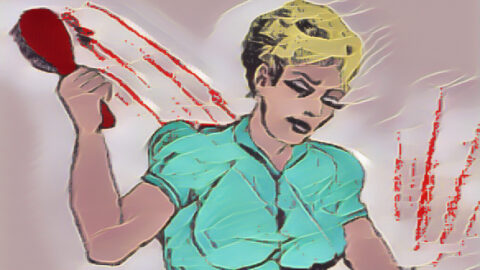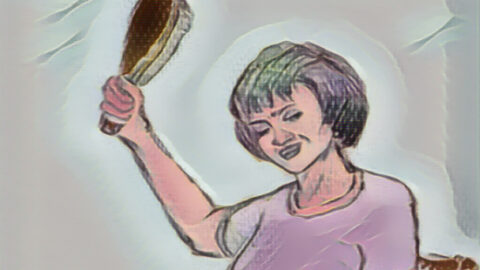(gap: 2s) The memory of that day remains as clear as ever, set against the backdrop of our small town’s bustling high street in the late 1960s. The shop windows were dressed for Christmas, tinsel glinting in the pale winter sun, and the air was filled with the scent of coal smoke, oranges, and the faint tang of boiled sweets. I remember weaving through the crowds, arms full of brown paper parcels tied with string, the sound of laughter and the distant notes of a brass band playing carols drifting from the village green. Seeking a moment’s peace, I slipped into the ladies’ lounge at the back of Woolworths—a quiet haven away from the holiday bustle—to tidy my hair and catch my breath.
(short pause) The lounge was softly lit, its mirrors reflecting the twinkle of fairy lights strung along the corridor outside. As I stood at the sink, smoothing my hair and straightening my wool skirt, the door swung open with a sudden urgency. A woman in her early thirties entered, her face flushed with exasperation, her gloved hand firmly gripping the wrist of a small boy—Peter—in a duffle coat and short trousers. Peter’s whines echoed off the tiled walls, his cheeks streaked with tears, his fists balled in protest.
(pause) Without hesitation, the mother guided Peter to a padded bench along the far wall. Her movements were brisk, but not unkind—there was a weary determination in her eyes, the look of a parent who’d reached her limit. She sat, pulled Peter gently but firmly over her knee, and began to scold him in a low, controlled voice. The words tumbled out—something about a toppled display of Christmas crackers, repeated warnings, and the need to learn respect. Peter’s protests grew louder, but the mother’s resolve did not waver.
(short pause) With a steady hand, she adjusted Peter’s position, ensuring he was properly over her knee, his legs dangling and his face pressed into the soft fabric of the bench. The room seemed to hold its breath. Then, with measured firmness, she raised her hand and delivered the first smack. The sound was sharp, echoing faintly in the quiet lounge. Peter gasped, his little body tensing in surprise. The mother continued, delivering a total of eight crisp, well-aimed smacks, each one landing squarely on the seat of Peter’s grey shorts. Peter’s cries grew with each smack, his feet kicking in protest, but the mother’s hand did not falter. By the fifth smack, his sobs had become genuine, his cheeks wet with tears, and by the eighth, he was thoroughly contrite, his spirit subdued.
(pause) When she finished, she set the now-crying Peter back on his feet. His face was red and blotchy, his sobs hiccuping in his chest. For a moment, he stood there, stunned—his eyes wide with shock, his small hands rubbing the seat of his shorts as if he couldn’t quite believe what had just happened. Then, indignation flared in his expression. He stamped his foot, his voice trembling with a mixture of outrage and wounded pride. “You can’t do that!” he cried, his words tumbling out between hiccupped sobs. “I’ll tell the police! I’ll tell the bobby and you’ll be arrested!” The threat was both fierce and innocent, the sort of thing only a child could say with such conviction. His cheeks were streaked with tears, but his chin jutted out defiantly, as if daring his mother to challenge him.
(short pause) For a heartbeat, the room was frozen. The mother’s eyes widened in disbelief, her mouth opening in silent shock at her son’s audacity. Then, her expression softened, a weary smile tugging at the corners of her mouth. She knelt down to Peter’s level, her voice gentle but firm. “Oh, Peter,” she said, brushing a tear from his cheek, “the bobby would only tell you to behave yourself—and perhaps give you a smack himself for good measure.” Her words were delivered with a mixture of affection and authority, the drama of the moment tempered by the innocence of childhood and the certainty of a mother’s love.
(pause) I glanced at the other woman standing beside me at the sink, both of us caught between embarrassment and amusement. We exchanged a look—one of those silent, grown-up conversations that pass in a heartbeat—before turning our attention back to the unfolding scene.
(pause) After a moment of awkward silence, my ‘sink partner’ acted. With a calm decisiveness, she reached into her handbag and produced an old-fashioned wooden hairbrush, its polished surface gleaming under the lounge’s soft lights. She offered it to Peter’s mother with a gentle, knowing smile, her eyes twinkling with a mix of mischief and solidarity.
(short pause) “Why not consider this your ‘home away from home’?” she suggested, her tone light but unmistakably supportive. Then, turning to me, she added, “And I daresay there are witnesses here who’d confirm nothing untoward happened.” I couldn’t help but smile, nodding in agreement, feeling a quiet camaraderie in that moment.
(pause) Several minutes later, the atmosphere in the lounge had shifted. Peter, now subdued and contrite, stood with his back to us. His mother returned the borrowed hairbrush with a grateful smile, her eyes shining with relief and gratitude. The tension had melted away, replaced by a sense of shared understanding among the adults.
(short pause) But Peter’s earlier outburst about the police had not gone unnoticed. His mother, still holding the hairbrush, called him back to her side. Her voice was calm but resolute. “Peter, since you think the bobby should be involved, perhaps you need a reminder of what happens when you don’t listen.” She sat down again, and, with a gentle but firm hand, guided Peter back over her knee—this time, the hairbrush in her grasp.
(pause) The room fell silent as Peter, wide-eyed and sniffling, found himself once more across his mother’s lap. She raised the hairbrush and brought it down with a crisp, unmistakable sound. The first smack landed squarely, and Peter yelped in surprise. The hairbrush continued its work, each swat firm but measured, echoing through the lounge. Peter’s cries grew louder, his legs kicking in protest, but his mother’s resolve did not waver. By the fourth smack, his sobs were desperate, and by the sixth, he was pleading for forgiveness, promising to behave. After eight solid smacks with the hairbrush, she set him gently back on his feet.
(short pause) Peter’s face was a picture of shock and contrition, his cheeks wet with fresh tears, his hands rubbing the seat of his shorts with renewed urgency. The lesson, this time, was unmistakable. The other woman knelt in front of Peter, her manner gentle as she dabbed at his tears with a handkerchief. She spoke to him quietly but firmly, telling him that if he were her son—and if there was any more naughtiness or talk of calling the police—she’d fetch the constable herself, and have him come round with his leather belt to give him something to really remember. Her words were delivered with a twinkle in her eye, but the message was clear: respect and consequences go hand in hand.
(pause) Looking up at Peter’s mother, she asked with a playful smile if she’d like the constable’s telephone number. The mother, her composure restored, turned to Peter and asked if that would be necessary. Peter, eyes wide and head shaking, assured her it would not. The moment was softened by shared laughter, the tension finally broken.
(short pause) As mother and son prepared to leave, there was a new understanding between them—a silent agreement, forged in the heat of the moment and sealed with a mother’s love. Peter clung to his mother’s hand, subdued but safe, the lesson learned and the bond between them quietly reaffirmed.
(pause) As they disappeared into the busy high street, I watched Peter reach back to rub the seat of his shorts, his steps a little slower, his head bowed in thought. I doubted he would soon forget the lesson of that afternoon—or the strength and certainty of his mother’s love. And I was just as certain that, should the need arise, she would never again hesitate to remind him.



























































